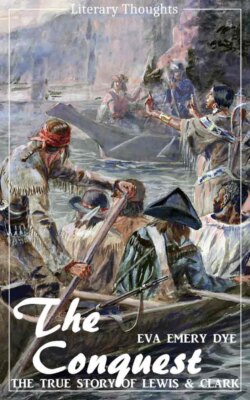Читать книгу The Conquest: The True Story of Lewis and Clark (Eva Emery Dye) - illustrated - (Literary Thoughts Edition) - Eva Emery Dye - Страница 10
На сайте Литреса книга снята с продажи.
Chapter V – A BARREL OF GUNPOWDER
ОглавлениеScarcely was Jefferson home from signing the Declaration when back from Kentucky came little William's tall strong brother, George Rogers Clark, elected by those far-away settlers, in June of 1776, to represent them in the assembly of Virginia.
Cut by a thousand briars, with ragged clothes and blistered feet, Clark looked in at the home in Caroline and hurried on to Williamsburg.
"The Assembly adjourned? Then I must to the Governor. Before the Assembly meets again I may effect what I wish."
Patrick Henry was lying sick at his country-home in Hanover when the young envoy from Kentucky was ushered to his bedside. Pushing his reading spectacles up into his brown wig, the Governor listened keenly as the young man strode up and down his bed-chamber.
The scintillant brown eyes flashed. "Your cause is good. I will give you a letter to the Council."
"Five hundredweight of gunpowder!" The Council lifted their eyebrows when Clark brought in his request.
"Virginia is straining every nerve to help Washington; how can she be expected to waste gunpowder on Kentucky?"
"Let us move those settlers back to Virginia at the public expense," suggested one, "and so save the sum that it would take to defend them in so remote a frontier."
"Move Boone and Kenton and Logan back?" Clark laughed. Too well he knew the tenacity of that border germ. "So remote a frontier? It is your own back door. The people of Kentucky may be exterminated for the want of this gunpowder which I at such hazard have sought for their relief. Then what bulwark will you have to shield you from the savages? The British are employing every means to engage those Indians in war."
Clark knew there was powder at Pittsburg. One hundred and thirty-six kegs had just been brought up by Lieutenant William Linn with infinite toil from New Orleans, the first cargo ever conveyed by white men up the Mississippi and Ohio.
"We will lend you the powder as to friends in distress, but you must be answerable for it and pay for its transportation."
Clark shook his head,—"I cannot be answerable, nor can I convey it through that great distance swarming with foes."
"We can go no farther," responded the Council, concluding the interview. "God knows we would help you if we could, but how do we even know that Kentucky will belong to us? The assistance we have already offered is a stretch of power."
"Very well," and Clark turned on his heel. "A country that is not worth defending is not worth claiming. Since Virginia will not defend her children, they must look elsewhere. Kentucky will take care of herself."
His words, that manner, impressed the Council. "What will Kentucky do?"
To his surprise, the next day Clark was recalled and an order was passed by the Virginia Council for five hundred pounds of gunpowder, "for the use of said inhabitants of Kentucki," to be delivered to him at Pittsburg. Hardly a month old was the Declaration of Independence when the new nation reached out to the west.
"Did you get the powder?" was the first greeting of young William Clark as his brother re-entered the home in Caroline.
"Yes, and I fancy I shall get something more."
"What is it?" inquired the little diplomat, eager as his brother for the success of his embassy.
"Recognition of Kentucky." And he did, for when he started back Major Clark bore the word that the Assembly of Virginia had made Kentucky a county. With that fell Henderson's proprietary claim and all the land was free.
With buoyant heart Clark and Jones, his colleague, hastened down to Pittsburg. Seven boatmen were engaged and the precious cargo was launched on the Ohio.
But Indians were lurking in every inlet. Scarce were they afloat before a canoe darted out behind, then another and another.
With all the tremendous energy of life and duty in their veins, Clark and his boatmen struck away and away. For five hundred miles the chase went down the wild Ohio. At last, eluding their pursuers, almost exhausted, up Limestone Creek they ran, and on Kentucky soil, dumped out the cargo and set the boat adrift.
While the Indians chased the empty canoe far down the shore, Clark hid the powder amid rocks and trees, and struck out overland for help from the settlements. At dead of night he reached Harrod's Station. Kenton was there, and with twenty-eight others they set out for the Creek and returned, each bearing a keg of gunpowder on his shoulder.
